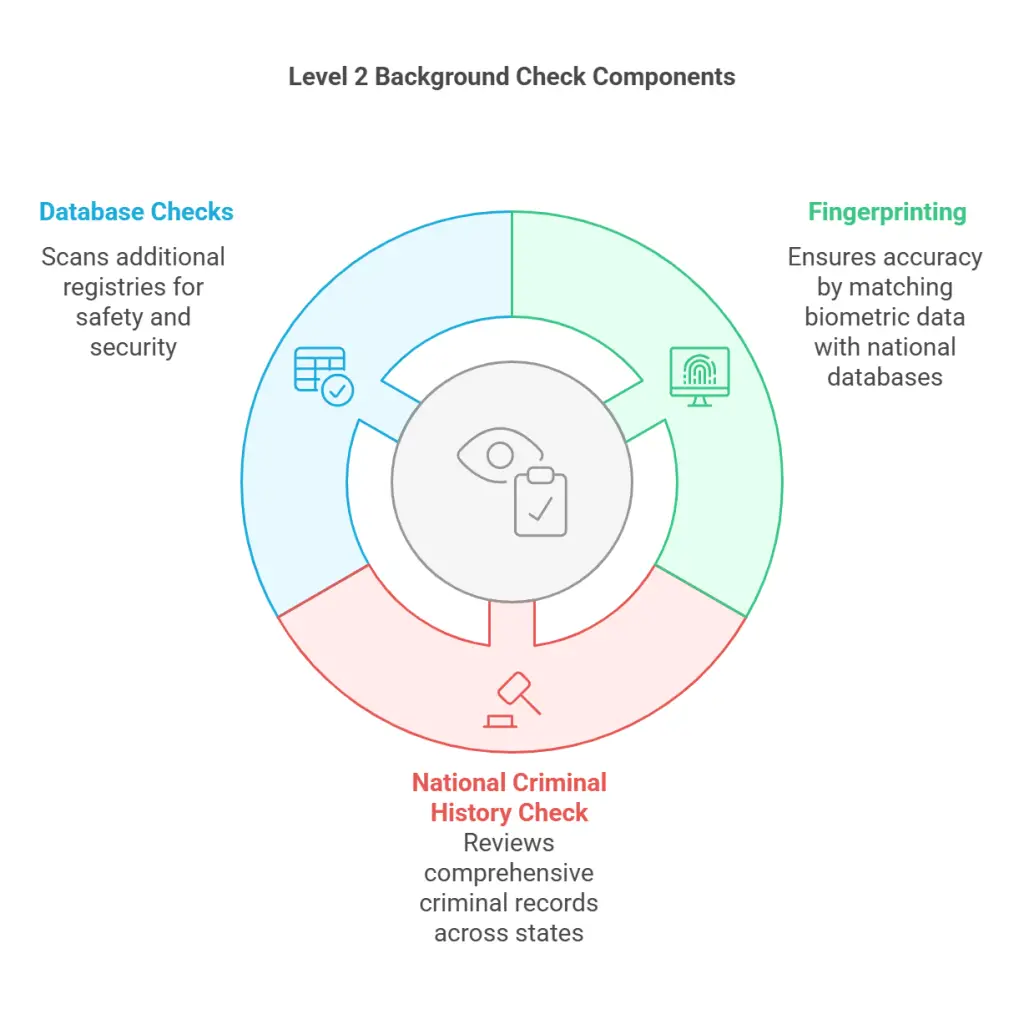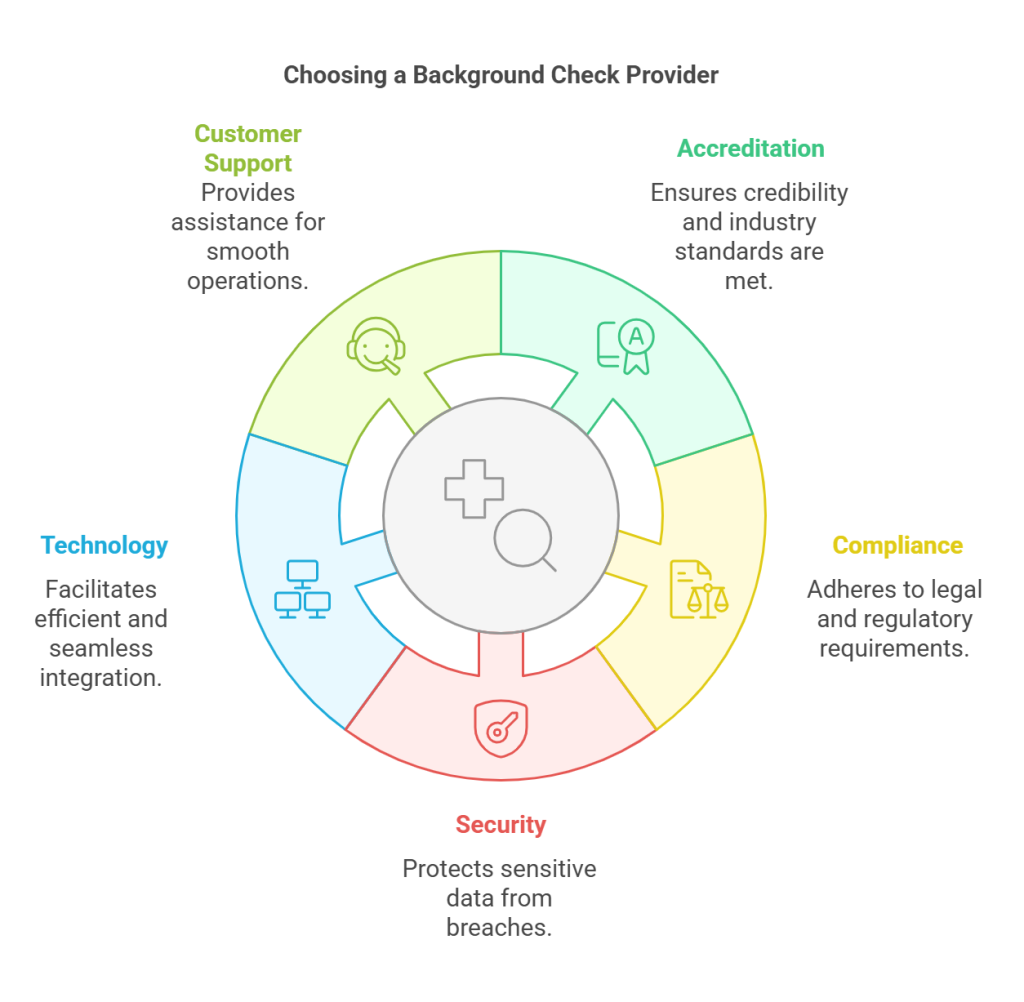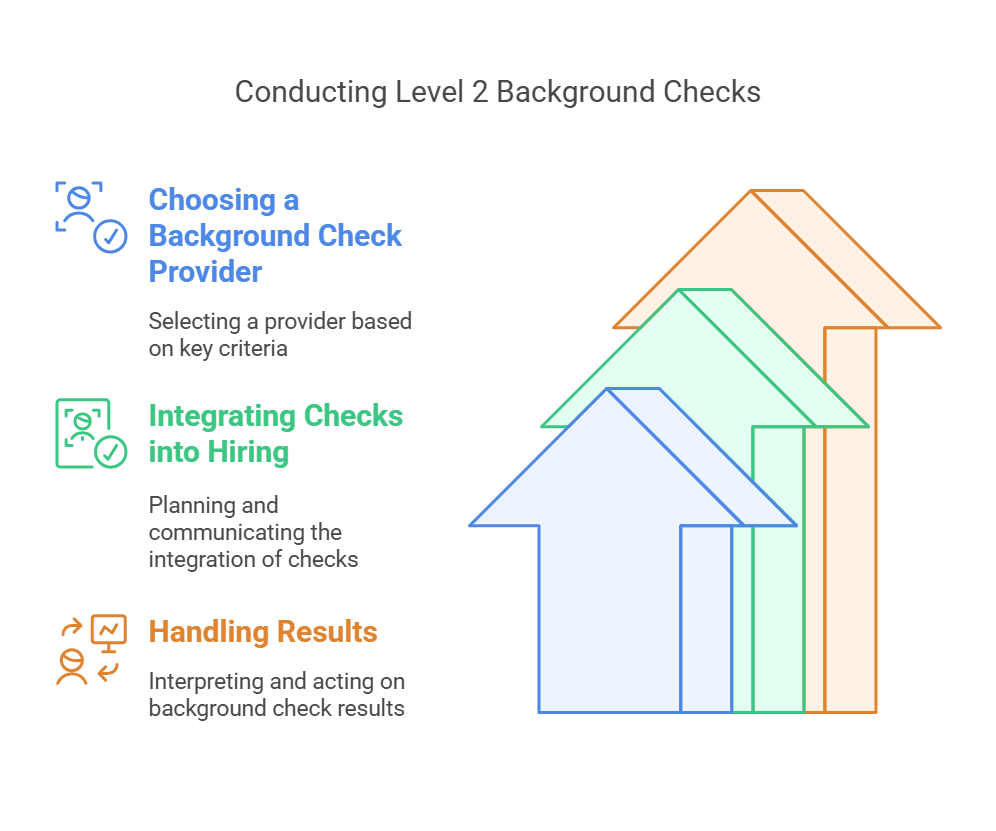Comprehensive background checks are crucial for ensuring workplace safety and making informed hiring decisions. The Level 2 background check stands out for its thoroughness and depth among the various forms of background checks. This guide will help business owners, HR professionals, recruiters, and job seekers understand the intricacies of Level 2 background checks, highlighting state-specific differences and addressing common concerns.
Key Takeaways
- Level 2 background checks go beyond basic screenings by including fingerprinting and consulting multiple databases to ensure comprehensive candidate vetting.
- These checks are crucial for industries requiring high trust and safety, such as healthcare, childcare, and finance.
- State-specific requirements can influence the depth and scope of Level 2 background checks, making local compliance essential.
- To ensure legal and ethical background check practices, employers must adhere to federal and state regulations, including FTC and EEOC guidelines.
- Thorough preparation and transparent communication can streamline the Level 2 background check process for employers and job seekers.
Introduction
In today's highly competitive and security-focused job market, thorough background checks have become indispensable. Employers aren't just looking for the most skilled candidates; they need to ensure those candidates can contribute to a safe and trustworthy work environment. That's where Level 2 background checks come in. So, what makes a Level 2 background check stand out?
A Level 2 background check delves deeper than your standard pre-employment screening. Not only does it include national criminal history, but it also involves fingerprinting and consulting multiple databases to provide a comprehensive review of a candidate's background. It’s particularly detailed and often mandated for sensitive positions where safety and trust are paramount.
Conducting Level 2 background checks is smart, from healthcare and childcare to roles involving financial responsibilities or access to confidential information. These checks ensure that individuals in critical roles are thoroughly vetted, making your workplace more secure and hiring decisions more informed.
Welcome to the guide that demystifies Level 2 background checks. Whether you’re a business owner, an HR professional, a recruiter, or a job seeker, this comprehensive breakdown will help you understand the nuances and benefits of taking your due diligence to the next level.
Looking for Level 1 Background Check instead?

What is a Level 2 Background Check?
A Level 2 background check is a comprehensive screening that digs into a candidate's history more thoroughly than standard. It’s like swapping out a magnifying glass for a microscope—aimed at ensuring that individuals in sensitive roles don’t pose a threat.
EXPERT INSIGHT: When the stakes are high for safety, well-being, and company image, it's crucial to conduct thorough background checks for higher assurance. Level 2 background checks provide a deeper and more comprehensive screening process, ensuring that individuals in sensitive roles are thoroughly vetted. Learn more about the importance and intricacies of Level 2 background checks in this article. - Emile Garcia, SHRM-SCP, CHRP, CHRBP
Definition
Level 2 background checks aren’t your run-of-the-mill screenings. They go beyond basic identity verification and employment history, diving deep into criminal records across state and national databases. These checks leverage fingerprinting to ensure the person being checked is who they say they are, providing an additional layer of security.
Components
Here’s what you can expect in a Level 2 background check:
- Fingerprinting: This part is crucial. Fingerprints are cross-checked against the FBI’s national database and other repositories to find matches with any criminal records.
- National Criminal History Check: This involves scrutinizing a candidate’s criminal history across state and federal levels.
- Database Checks: The process includes digging into various databases, from sex offender registries to terrorist watch lists and everything in between.
Industries Requiring Level 2 Checks
Certain industries don’t just recommend Level 2 background checks—they mandate them. These checks are critical in fields where trust and safety are non-negotiable:
- Healthcare: From doctors to hospital administrative staff, ensuring a clean background helps protect patient safety.
- Childcare: Teachers, daycare staff, and other childcare providers undergo these checks to safeguard children.
- Positions of Trust: This broad category includes roles in finance, legal, and other sectors where the risk of malfeasance can have far-reaching impacts.
Navigating the intricacies of a Level 2 background check can seem daunting, but its thoroughness ensures that businesses and organizations are employing trustworthy individuals.
Differences in Level 2 Background Checks by State
States have varying requirements regarding Level 2 background checks, which can influence the depth and scope of the investigation. Understanding these state-specific nuances is essential for compliance and ensuring thorough vetting.
State-Specific Requirements
Different states impose unique criteria based on local regulations and industry demands. This means that a Level 2 background check in one state might differ from another, affecting both the process and the outcome.
Florida
Level 2 background checks are mandated in Florida for certain positions, particularly in healthcare and education. The state's requirements include fingerprinting and an extensive review of national criminal databases, ensuring that individuals in sensitive roles are thoroughly vetted.
California
California, known for its strict privacy laws, has additional layers of regulation concerning background checks. Childcare, healthcare, and education positions often necessitate a Level 2 background check, with further stipulations under the state's Fair Chance Act limiting pre-employment inquiries into a candidate’s criminal history until a conditional offer is made.
New York
In New York, Level 2 background checks are prevalent in finance, education, and healthcare industries. The state mandates checks that include a detailed criminal history review and specific scrutiny for roles involving vulnerable populations.
Licensing and Certification
State-specific requirements for Level 2 background checks also extend to professional licensing and certification. For instance, healthcare professionals in various states must clear these checks to obtain or renew their licenses. Failure to comply with state-specific guidelines can result in delays or denials, stressing the importance of understanding local regulations.
In summary, while the core components of Level 2 background checks remain consistent, state-specific differences can significantly influence the processes. Knowing these distinctions, from additional checks to unique legislative requirements, is critical for compliance and a thorough hiring process.
Key Aspects of a Level 2 Background Check
Fingerprinting
Fingerprinting is a cornerstone of the Level 2 background check process. Unlike simpler background checks that might rely solely on name-based searches, Level 2 checks require fingerprinting to ensure accuracy. This biometric data is matched against national criminal databases, including the FBI’s Integrated Automated Fingerprint Identification System (IAFIS). The process starts with scheduling an appointment at an authorized service location. The prints are then digitally captured and sent directly to law enforcement agencies for analysis. This step minimizes the risk of false positives or negatives, making it particularly vital for roles involving vulnerable populations like children or the elderly.
National Criminal History Check
The national criminal history check is where Level 2 background checks ramp up their thoroughness. This check dives into records across all states, including misdemeanors, felonies, and other criminal activities. It's not just about scrutinizing police records; it covers court records, imprisonment records, and even certain immigration statuses. This significant breadth provides a fuller picture of an individual's criminal past, acting as a critical filter for roles where trust and safety are paramount. Including non-public information further ensures no stone is left unturned, appealing especially to highly regulated industries such as healthcare and childcare.
Database Checks
Lastly, Level 2 background checks include comprehensive database inquiries. These checks scour multiple national and state-specific databases to find information that might not appear in standard criminal history checks. Databases commonly reviewed include:
- National Sex Offender Registry: Ensures the individual is not listed as a sex offender.
- Terrorist Watch Lists: Checks for any affiliation or suspicion of involvement in terrorist activities.
- FBI Databases: This function accesses additional information that might be stored in FBI records but not necessarily within local or state records.
- State-Specific Databases: These include other locally mandated registries that vary by state.
These additional database checks act as a safety net, capturing information that might otherwise slip through. For industries like education, where safeguarding the well-being of young individuals is crucial, these checks are non-negotiable. Even for sectors that deal minimally with sensitive populations, the peace of mind these thorough checks provide can make the investment worthwhile.
By examining these key aspects—fingerprinting, national criminal history checks, and database checks—employers can rest assured that they are conducting their due diligence comprehensively. This meticulous approach aids in the creation of safer and more reliable workplaces.

Common Questions Around Level 2 Background Checks
How Far Back Does a Level 2 Background Check Go?
The scope of a Level 2 background check can vary depending on state regulations and specific industry requirements. Generally, these checks can go back seven to ten years, covering a significant portion of an individual's criminal history. However, checks can delve deeper into certain cases and industries, sometimes extending to lifetime records, especially for positions in sensitive fields like healthcare, childcare, and other roles involving vulnerable populations.
The situation can be more nuanced for older offenses and expunged records. Expunged records are typically not included in background checks, but this can depend on the offense's state and nature. For instance, some states allow access to expunged records if severe crimes occur. Always check specific state guidelines to understand the exact parameters.
How Long Does a Level 2 Background Check Take?
The timeline for completing a Level 2 background check can range from a few days to several weeks. Typically, you can expect the process to take about two to four weeks. The duration can be influenced by several factors, including:
- State Regulations: Some states have more thorough and time-consuming requirements.
- Completeness of Records: If the individual has lived in multiple states or has a complex background, the process may take longer as more records need to be reviewed.
- Efficiency of Agencies: The promptness of local law enforcement and other agencies in providing required information can also impact the timeline.
In summary, while a Level 2 background check is detailed and can take longer than more basic checks, its thoroughness helps ensure a safer and more trustworthy hiring process.
Additional Research: Level 2 screening involves comprehensive criminal background checks, including fingerprint-based checks for statewide and national criminal history records. This type of screening is typically required for employees and volunteers in certain positions, such as those working with children or vulnerable populations. This study outlines the process and requirements for Level 2 background screening at the University of Florida, including fingerprint-based checks and the need for recertification every 5 years. See Level 2 Screening - University of Florida.
Level 2 Background Check Differences by State
This table provides an overview of the components included in Level 2 background checks and highlights additional checks that might be specific to certain states.
| State | Fingerprinting | National Criminal History | State Criminal History | Child Abuse Registry | Sex Offender Registry | Additional Checks |
|---|---|---|---|---|---|---|
| Florida | Yes | Yes | Yes | Yes | Yes | Employment verification, professional license check |
| California | Yes | Yes | Yes | Yes | Yes | Social services history, financial background for specific positions |
| New York | Yes | Yes | Yes | Yes | Yes | Education verification, driving records |
| Texas | Yes | Yes | Yes | Yes | Yes | Employment history, drug testing for certain positions |
| Illinois | Yes | Yes | Yes | Yes | Yes | Professional license verification, health and human services database checks |
| Ohio | Yes | Yes | Yes | Yes | Yes | Social media screening for specific roles, OIG exclusion list |
| Georgia | Yes | Yes | Yes | Yes | Yes | Credit checks for financial roles, military service record checks |
| Michigan | Yes | Yes | Yes | Yes | Yes | Civil litigation history, work eligibility verification (I-9) |
| North Carolina | Yes | Yes | Yes | Yes | Yes | Previous employer references, residency verification |
| Pennsylvania | Yes | Yes | Yes | Yes | Yes | Higher education institution checks, FBI fingerprint checks for sensitive roles |
Explanation of Columns
- Fingerprinting: Does the background check include fingerprinting for accuracy?
- National Criminal History: Inclusion of national criminal databases such as the FBI's NCIC.
- State Criminal History: Search within state criminal databases.
- Child Abuse Registry: Check for records in child abuse and neglect registries.
- Sex Offender Registry: Search within sex offender registries.
- Additional Checks: Other specific checks may be included depending on the state or position being applied for.
Preparing for a Level 2 Background Check
For Employers and Recruiters
Getting ready for Level 2 background checks requires a bit more than ticking boxes. Here are some straightforward steps to make the process smoother and legally sound:
- Inform Candidates: Transparency is key. Let potential hires know that a Level 2 background check is part of the hiring process. Explain what's involved and ensure they understand the necessity of fingerprinting, national criminal history checks, and database checks. This reduces surprise and resistance, leading to a smoother process.
- Legal Compliance: Brush up on the federal and state background check laws. Federal laws, like the Fair Credit Reporting Act (FCRA), have specific guidelines on how to notify applicants and handle their information. State regulations can differ widely, so make sure you're compliant wherever you're hiring. Non-compliance can lead to hefty fines and legal trouble.
- Set Clear Policies: Establish clear policies on handling the information obtained from these checks. Decide in advance what kinds of criminal history will be grounds for disqualification and ensure these policies are non-discriminatory and consistent across all candidates.
For Job Seekers
Knowing what to expect in a Level 2 background check can demystify the process and alleviate some anxiety. Here’s what you can do to prepare:
- Gather Documentation: Have all necessary documents ready. This includes identification proofs like your driver’s license, social security number, and relevant certifications. Having these prepared in advance can speed up the verification process.
- Be Proactive: If you have any past legal issues, be upfront about them. Employers are often more interested in your honesty and how you've moved forward since than the fact that there's an issue to discuss. Expunged or sealed records might not show up, but if anything might raise a flag, it's better to address it head-on.
- Check Your Background: Consider running a background check on yourself to see what might come up. This allows you to correct any errors in your records that might slow down your hiring process.
By preparing correctly, employers and job seekers can easily navigate the complexities of Level 2 background checks, ensuring compliance and reducing potential friction.
Legal and Compliance Considerations
Navigating the maze of legal and compliance issues when conducting Level 2 background checks can be daunting, but staying informed is crucial. The following sections will outline key guidelines from respected bodies and delineate industry-specific requirements.
Federal Trade Commission Guidelines
The Federal Trade Commission (FTC) offers crucial guidance on conducting background checks ethically and legally. According to the FTC, employers must notify candidates clearly and conspicuously that a background check will be conducted. This notification must be in a standalone document, not buried in fine print or mixed with other paperwork. Additionally, employers must obtain written consent from the candidate before proceeding.
If any adverse action is taken based on the background check results, the FTC mandates that the candidate be informed and provided with a copy of the report and a summary of their rights under the Fair Credit Reporting Act (FCRA). This transparency ensures that candidates can review and dispute any inaccuracies in the report, maintaining fair hiring practices.
Equal Employment Opportunity Commission (EEOC) Compliance
The Equal Employment Opportunity Commission (EEOC) offers a layer of complexity to background check processes with its guidelines. The EEOC stresses that background checks should not be used in a discriminatory manner. This means employers must ensure that policies related to background checks do not disproportionately exclude certain groups of people.
A notable guideline is the need for individualized assessments. If a candidate's background check reveals a criminal record, the employer must consider the nature and gravity of the offense, the time that has passed since the offense, and the nature of the job in question. This approach helps to avoid blanket exclusion policies that may inadvertently discriminate against certain populations, promoting fairer employment practices.
Industry-Specific Compliance
Certain industries have stringent compliance requirements beyond the general guidelines provided by the FTC and EEOC.
- Healthcare: Healthcare roles often require additional screenings, such as checking state-specific abuse registries and verifying qualifications against professional licensure databases. Compliance with the Health Insurance Portability and Accountability Act (HIPAA) is vital, ensuring that personal health information remains confidential.
- Transportation: Compliance with Department of Transportation (DOT) regulations is essential in the transportation sector. This entails more rigorous drug and alcohol testing and adherence to continuous monitoring of driving records.
- Childcare and Education: Professionals in childcare and education must comply with specific state laws that often demand more stringent checks, including child abuse and neglect registries.
Understanding federal guidelines and industry-specific regulations helps maintain lawful hiring processes and contributes to building a safe and trustworthy work environment. Dallas-based businesses should pay particular attention to Texas state regulations, while those operating in New York or Florida must adhere to state-specific mandates detailed earlier. Being diligent in these areas ensures compliance and can protect an organization from legal repercussions.
Practical Steps in Conducting Level 2 Background Checks

Choosing a Background Check Provider
When selecting a provider for Level 2 background checks, prioritize reputation and reliability. Look for companies with proven experience in handling the specific needs of your industry. While endorsements from peers can be valuable, here are some critical factors to consider:
- Accreditation: Ensure the provider is accredited by the Professional Background Screening Association (PBSA) or other similar organizations.
- Compliance: The provider should be well-versed in federal and state regulations, including the Fair Credit Reporting Act (FCRA) and Equal Employment Opportunity Commission (EEOC) guidelines.
- Security: Choose a provider that adheres to stringent data security practices to protect both your organization and your candidates.
- Technology: Modern, user-friendly platforms that integrate smoothly with your existing HR systems can save significant time and hassle.
- Customer Support: Good customer service can be the difference in ensuring smooth operations, so choose a provider with reliable and accessible support.
Integrating Background Checks with the Hiring Process
Integrating Level 2 background checks into your hiring process requires careful planning and clear communication.
- Early Disclosure: Inform candidates early in the hiring process about needing a Level 2 background check. Transparency builds trust and sets clear expectations.
- Consent: Obtain explicit written consent from candidates before conducting any background checks. This is a legal requirement and a good practice for maintaining ethical standards.
- Clear Process: Define and communicate the steps, from initial application to final hiring decision. A predictable process can reduce candidate anxiety and improve their experience.
- Timelines: Set realistic timelines for completing the checks, keeping in mind that delays can occur due to various factors such as jurisdictional differences or volume of records.
- Contingencies: Have a plan for handling issues during the background check process, such as disputes over findings or incomplete data.
Handling Results
Interpreting the results of a Level 2 background check requires a balanced approach to ensure fairness and compliance.
- Reviewing Reports: Carefully review the background check report, paying close attention to any red flags. Context is crucial; not all negative findings should automatically disqualify a candidate.
- Adverse Action Process: If you decide not to hire based on the results, follow the adverse action process:
- Provide the candidate with a pre-adverse action notice, including a copy of the background check report and their rights under the FCRA.
- Allow the candidate a reasonable period to dispute any inaccuracies in the report.
- After considering any disputes, if you still decide against hiring, send a final adverse action notice outlining the decision and their rights.
- Documentation: Keep detailed records of all background checks and any actions taken. This can protect your organization in case of future disputes and ensure compliance with record-keeping regulations.
- Fairness and Consistency: Apply the same standards and processes to all candidates to avoid potential discrimination claims.
By following these practical steps, you can ensure that your Level 2 background checks are thorough, compliant, and fair, ultimately supporting safer and more informed hiring decisions.

Frequently Asked Questions
What is a Level 2 background check?
A Level 2 background check is a more in-depth screening that includes fingerprint-based checks, searches of state and national criminal databases, and sex offender registries.
How is a Level 2 background check different from a Level 1 check?
It typically includes name-based local and state criminal record searches, while a Level 2 involves fingerprinting and more extensive federal and statewide searches.
Who needs a Level 2 background check in Florida?
Extensive background check are required in Florida for positions involving vulnerable populations, such as teachers, healthcare workers, childcare providers, and law enforcement personnel.
What does a Level 2 background check look for?
It screens for disqualifying offenses, including violent crimes, sex offenses, fraud, and serious felony convictions, to ensure candidates meet strict employment eligibility requirements.
How long does a Level 2 background check take?
It typically takes 3–5 business days but can take longer depending on fingerprint processing and additional record verification.
Do all states require Level 2 background checks?
No, these are most commonly associated with Florida law but may be required in other states for positions with high security or trust requirements.
Can you pass a Level 2 background check with a misdemeanor?
It depends on the nature of the misdemeanor and the employer’s hiring policies. Some minor offenses may not be disqualifying, while others, like theft or assault, may be.
Do Level 2 background checks include FBI records?
Yes, Level 2 checks include FBI criminal history records obtained through fingerprint submissions.
What jobs require a Level 2 background check?
Jobs in education, healthcare, government, childcare, and security-sensitive industries often require a this.
How can you dispute an error in a Level 2 background check?
If you find an error, you can dispute it with the background check provider or the FBI under the Fair Credit Reporting Act (FCRA) and provide supporting documents for correction.
How far back does a Level 2 background check go?
It typically goes back indefinitely for criminal records, depending on state laws and the reporting policies of different agencies.
Do sealed or expunged records show up on a Level 2 background check?
No, properly sealed or expunged records should not appear in this document. However, errors can occur, and candidates should check their records before applying.
What databases are searched in a Level 2 background check?
This includes searches of the FBI criminal history database, state law enforcement records, sex offender registries, and various national criminal databases.
Can you fail a Level 2 background check?
Yes, individuals with disqualifying offenses—such as violent felonies, sex crimes, or fraud—may fail a Level 2 background check, depending on the employer’s policies and state regulations.
How much does a Level 2 background check cost?
The cost varies by state and provider but generally ranges from $50 to $100, including fingerprint processing fees.
Are credit checks included in a Level 2 background check?
No, a Level 2 background check typically focuses on criminal history and fingerprint records. However, some employers may conduct separate credit checks for financial roles.
How do employers conduct a Level 2 background check?
Employers request a Level 2 background check through an authorized state agency, and candidates must provide fingerprints for processing through the FBI and state law enforcement databases.
Can you work while waiting for a Level 2 background check?
It depends on the employer’s policy. Some organizations allow employees to start work with restrictions, while others require the check to be completed first.
Do volunteer positions require a Level 2 background check?
Yes, in some cases, volunteers working with children, elderly individuals, or other vulnerable populations may need a more extensive check.
How often do you need to renew a Level 2 background check?
The renewal period depends on state laws and industry regulations. Some employers require renewals every 5 years, while others may have stricter requirements.
Conclusion
Level 2 background checks are the gold standard for hiring due diligence. They provide a rigorous and expansive review of a candidate's history, thus ensuring that businesses make well-informed decisions prioritizing safety and integrity. Understanding these checks can seem intricate for business owners, HR professionals, and job seekers, but it is undeniably worth the effort.
Despite the challenges presented by varying state regulations and the complexity of multiple databases, the benefits of conducting comprehensive Level 2 background checks far outweigh the effort. They safeguard your workplace, foster a culture of trust, and ultimately lead to better staffing outcomes.
In conclusion, make Level 2 background checks an integral part of your hiring process. Doing so mitigates risks and reinforces a proactive approach to workplace safety and responsibility. Your effort today lays the groundwork for a secure and reliable workforce tomorrow. So, prioritize these checks and navigate your due diligence journey with the assurance that you’re making informed, sound hiring decisions.

GCheck Editorial Team
Meet the GCheck Editorial Team, your trusted source for insightful and up-to-date information in the world of employment background checks. Committed to delivering the latest trends, best practices, and industry insights, our team is dedicated to keeping you informed.
With a passion for ensuring accuracy, compliance, and efficiency in background screening, we are your go-to experts in the field. Stay tuned for our comprehensive articles, guides, and analysis, designed to empower businesses and individuals with the knowledge they need to make informed decisions.
At GCheck, we're here to guide you through the complexities of background checks, every step of the way.





